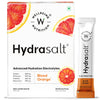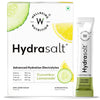When we talk about staying hydrated, the default advice is usually: drink more water. But hydration is more than just refilling your glass throughout the day. In fact, drinking water alone without replenishing the minerals your body loses through sweat, movement, or stress might not hydrate you the way you think. That’s where electrolytes come in.
Electrolytes are minerals that carry an electric charge. Think of them as microscopic messengers, quietly working behind the scenes to keep essential processes running smoothly. Sodium, potassium, magnesium, calcium, and chloride are among the most important of these. They help your body absorb and distribute water where it’s needed, regulate nerve impulses, and support muscle function. Even your heartbeat and cognitive clarity rely on these tiny but mighty minerals.
Why Electrolyte Balance Is Essential
Your body thrives on balance, especially when it comes to hydration. Electrolytes help regulate the fluid inside and outside your cells. Without them, water wouldn’t know where to go, or worse, it might flow in the wrong direction. So even if you're drinking your recommended 8 glasses a day, your body might still struggle to stay hydrated if you're low on electrolytes.
When electrolytes are in balance, your body functions optimally. Your muscles contract and relax smoothly. Your brain communicates clearly with the rest of your body. You feel alert, focused, and energized. But if these levels dip even slightly, things can feel off. You may notice fatigue, muscle cramps, dizziness, or a cloudy mind. In more severe cases, imbalances can lead to arrhythmia, confusion, or even seizures (NIH).
This delicate mineral balance can be disrupted by a number of everyday factors like prolonged exercise, excessive sweating, heat, dehydration, medications, illness, or simply not getting enough from your diet. And it doesn’t always take much to cause an imbalance.
What Do Electrolytes Do in Your Body
Each electrolyte has a specific role. Sodium and chloride help maintain fluid balance and blood pressure. Potassium supports nerve function and muscle control. Magnesium helps regulate over 300 biochemical reactions, including muscle and nerve function, blood sugar levels, and blood pressure. Calcium supports muscle contractions and bone health.
What makes these minerals even more fascinating is their teamwork. For instance, when you move a muscle, whether it's lifting weights or simply blinking, your brain sends an electrical signal. That signal relies on the exchange of sodium and potassium across cell membranes. Magnesium helps regulate that signal, while calcium makes sure the muscle contracts when it should and relaxes when it’s time to stop. Without the right mix, even simple movements could feel strained or weak (NIH).
And it’s not just about the muscles. Electrolytes also play a key role in mental clarity. Dehydration or low electrolyte levels can contribute to poor concentration, foggy thinking, and even mood shifts. If you've ever felt inexplicably drained after a long day or travel, even if you weren’t particularly active, an electrolyte imbalance could be partly to blame.
Knowing About Optimum Hydration: A Balance of Water + Minerals
The word “hydration” tends to be associated with water, but hydration isn’t just about how much water you drink. It’s about how well your body holds on to it and how efficiently it gets distributed to the cells that need it.
This is where electrolytes truly shine. They act as regulators, guiding water into and out of cells and helping to maintain the right balance of fluids throughout your body. When sodium levels drop too low, your body may flush water too quickly. On the other hand, too much sodium can lead to water retention and bloating. Striking the right balance is crucial to staying hydrated without feeling depleted or puffy.
You don’t have to be an athlete or a desert hiker to experience dehydration. It can sneak up during a long workday, while traveling, or even after a night of poor sleep. Early signs include dry mouth, headaches, irritability, fatigue, or cramps. And while these symptoms are easy to dismiss, they often signal the beginning of a larger imbalance that deserves attention.
Daily Habits That Support Electrolyte Balance and Better Hydration
Supporting your body’s hydration needs doesn’t have to mean counting milligrams or overhauling your routine. A few intentional habits can go a long way.
-
Hydrate with purpose: Plain water is great, but it may not always be enough. On hot days, during exercise, travel, or illness, opt for an electrolyte-infused beverage that offers a balanced blend of sodium, potassium, and magnesium.
-
Eat mineral-rich foods: Nature provides plenty of options. Bananas, avocados, and sweet potatoes are great sources of potassium. Leafy greens like spinach and kale offer magnesium and calcium. Dairy can help boost calcium, while nuts and seeds provide healthy doses of magnesium. And if you’re looking for a natural, hydrating drink, coconut water is an excellent choice for a gentle electrolyte mix (NIH).
-
Tune into your body: If you're feeling light-headed, sluggish, or prone to muscle cramps, it could be your body's way of signaling a need for electrolyte replenishment. Don’t ignore these cues.
-
Supplement when needed: For those with physically demanding lifestyles, frequent travelers, or anyone in hot, humid environments, high-quality supplements can help maintain optimal electrolyte levels. A product like Wellbeing Nutrition’s Hydrasalt offers a precise blend of essential electrolytes in a convenient, fast-absorbing format—ideal for rehydrating after workouts, recovering from long days, or simply staying balanced throughout.
Final Thoughts
Electrolytes may be invisible, but their impact on your energy, focus, and performance is profound. They help your body do the most fundamental things: move, think, and function. Paying attention to them isn’t just for athletes or wellness enthusiasts—it’s for anyone who wants to feel balanced, energized, and resilient in the face of daily life.
Whether you’re powering through back-to-back meetings, dealing with summer heat, or simply trying to stay one step ahead of fatigue, supporting your electrolyte balance can help you show up at your best—mentally, physically, and emotionally.
Frequently Asked Questions
1.What are the symptoms of electrolyte imbalance?
Electrolyte imbalances can show up in many ways. You might notice headaches, muscle weakness, or fatigue at first. In more serious cases, symptoms can include confusion, irregular heartbeat, or even seizures. If anything feels off for an extended period, it’s important to speak with a healthcare provider to get proper guidance.
2.How do electrolytes help in hydration?
Electrolytes are essential for regulating how water moves throughout your body. They help direct fluid into and out of your cells, keeping everything balanced. Without the right amount of electrolytes, your body might not hold onto water effectively, even if you’re drinking plenty of it.
3.Can I get enough electrolytes from food alone?
A well-rounded diet filled with fruits, vegetables, leafy greens, nuts, seeds, and dairy products can usually provide the electrolytes your body needs. But if you’re very active, dealing with illness, or spending time in hot weather, your body may need extra support. In those moments, a well-formulated supplement can be helpful.
4.How much electrolytes do I need per day?
Your daily needs depend on several factors, including your age, lifestyle, and overall health. On average, most adults require around 1500 to 2300 milligrams of sodium, 3500 to 4700 milligrams of potassium, 310 to 420 milligrams of magnesium, and 1000 to 1300 milligrams of calcium. Always check with your doctor to understand what’s best for your specific needs.
5.What are the best electrolyte supplements for athletes?
Athletes need reliable hydration that supports performance and recovery. The best supplements offer a balanced combination of essential minerals without added sugars or artificial ingredients. Wellbeing Nutrition’s Hydrasalt is crafted to deliver just that, helping you stay energized and hydrated through every workout or long day.






























 DOWNLOAD NOW
DOWNLOAD NOW
